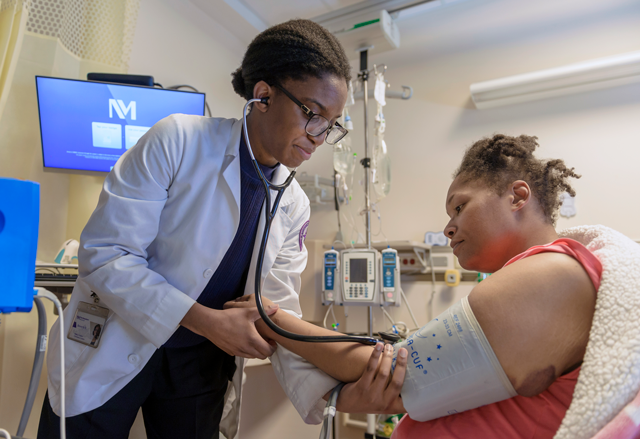The National Institutes of Health (NIH) has awarded Northwestern University a five-year, $46 million grant to renew the Northwestern University Clinical and Translational Sciences (NUCATS) Institute.
Funded by the NIH’s National Center for Advancing Translational Sciences (NCATS), the renewal ensures NUCATS will continue to collaborate with Northwestern investigators across multiple disciplines and schools to accelerate clinical and translational discoveries.
NUCATS brings clinical research to diverse participants and practice settings
By bringing clinical research to diverse practice settings and participants, NUCATS will help ensure that participation in clinical research becomes common, welcomed, easy, safe and efficient for all, Lloyd-Jones said.
"NUCATS is critical to the medical school’s research enterprise,” said Dr. Eric G. Neilson, vice president for medical affairs and the Lewis Landsberg Dean at Feinberg. “All the hard work done for this renewal by extraordinary faculty and staff demonstrates the continued evolution of NUCATS in advancing clinical and translational science for our entire academic health system. This funding will allow us to further advance our mission of improving health by accelerating the translation of discoveries into real-world cures and treatments.”
Breaking down research barriers
Over the next five years, NUCATS will focus on expanding research opportunities across the entire academic health system and on collaborating with patients and communities throughout the Chicago area.
The new Research Enabled and Accelerated in Community Healthcare (REACH) initiative will allow NUCATS to further integrate research into systems and processes of clinical care. The program aims to ensure every clinical encounter can be an opportunity for patients to participate in research studies or clinical trials.
Online portal being developed to help Chicago-area residents learn about and match with research studies that are publicly recruiting
Additionally, NUCATS, partnering with two other local NCATS-funded clinical and translational science program hubs, is developing a new online solution for clinical research recruitment. This initiative will provide Chicago-area residents with a single, robust online portal to learn about and match with research studies that are publicly recruiting across several institutions. NUCATS will continue to leverage the existing Trial Innovation Network to connect Northwestern investigators who are involved in multi-site clinical trials or studies with the nationwide clinical research consortium.
“This new Clinical and Translational Science Award will catalyze efforts to bring cutting-edge science and opportunities to participate in research studies to the point of care for doctors and patients across our growing health system and our community,” Lloyd-Jones said. “We also will train the next generation of young scientists and study teams to answer the critical questions needed to improve human health.”
Propelling careers in clinical research
The grant renewal includes essential funding for two career development awards: the Multidisciplinary Training Program in Child and Adolescent Health (TL1) award and the Multidisciplinary career Development Program (KL2) award.
Additionally, NUCATS will partner with Northwestern University Kellogg School of Management to develop a four-day course, Business for Clinical and Translational Scientists, to prepare junior investigators to effectively and efficiently manage and run a research team.
“NUCATS has been a critical resource for me as an early-career physician-scientist,” said Dr. Lisa B. VanWagner, assistant professor of medicine at Feinberg. “I engaged with NUCATS 10 years ago when I began the Master of Science in Clinical Investigation program. Since then, NUCATS has provided me with grant support through its pilot grant program and voucher programs, biostatistical and library services support, grant writing support and career development funding as a recent KL2 scholar. The resources and support that NUCATS offers to the Northwestern community are invaluable, particularly to early-career physician-scientists.”
Revolutionizing health care with informatics
As part of the new funding, NUCATS will continue to contribute to digital research infrastructures across the University and its clinical partners. The funds will help enhance Study Tracker, Northwestern’s clinical trials management system, to improve recruitment and efficiency so patients are empowered to participate in research more easily and fully. This includes a new tab that provides every Northwestern Medicine patient with online visibility to Study Tracker data about studies in which they participate, including study information and their participation status.
“I believe a critical factor that enabled this award is Northwestern’s strength in translational informatics and data science,” said Dr. Justin Starren, deputy director of NUCATS and director of the Center for Data Science and Informatics. “For more than a decade, Northwestern University Feinberg School of Medicine and our clinical partners have seen the potential for informatics to revolutionize health care and research, and have invested in the development of informatics systems to enable that vision. The Enterprise Data Warehouse is a national model of clinical/research collaboration. Study Tracker, which provides end-to-end digital management of clinical studies, will become available across our clinical network. The creation of the Center for Data Science and Informatics positions Northwestern for the future of artificial intelligence in medicine. These resources have already supported hundreds of researchers and thousands of studies. The award will enable us to make them even better.”
NUCATS launched in 2007 as a hub to support and accelerate research across seven schools and institutes at Northwestern University and three clinical partners in Chicago: Northwestern Memorial Healthcare, the Ann & Robert H. Lurie Children’s Hospital of Chicago and Shirley Ryan AbilityLab. NUCATS is made up of 10 centers and programs that have served thousands of investigators over the past 12 years and assisted in the publication of 1,563 scientific papers.
The new CTSA activities are funded by NCATS grants UL1TR001422, TL1TR001423 and KL2TR001424.


